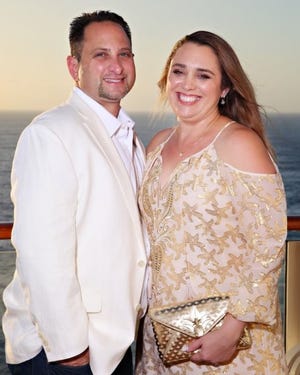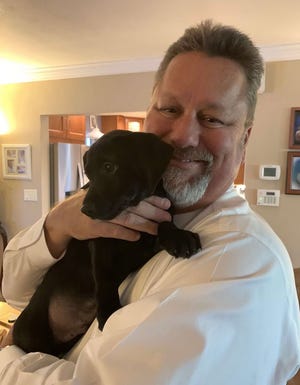Rational national gun legislation can easily be achieved if Republicans support what they achieved here in Florida in 2018 -- red flags, minimum age for purchase and proper background checks.
Yet U.S. Senator RICHARD LYNN SCOTT, who signed thse three refornms as Governor, refuses to support them as Senator.
Wonder why?
Florida's legislature responded swiftly and competently.
See below.
So why won't SCOTT speak for our State as our junior Senator?
Red flags, minimum age for purchase and proper background checks are Florida law.
Shouldn't they be considered for federal legislation?
Why is SCOTT silent?
From The Washington Post:
Florida Republicans beat the gun lobby. Congress hasn’t followed.
In 2018, Florida banned weapons sales to those younger than 21, imposed a three-day waiting period and created a “red flag” law. Republicans doubt the same can happen at the federal level.
But that broadside wasn’t entirely accurate: Not long ago, GOP lawmakers bucked ferocious pressure from the National Rifle Association to pass significant new gun restrictions after a deadly school shooting, which were then signed into law by a fiercely conservative Republican.
It just didn’t happen in Washington.
Three weeks after 17 people were gunned down in 2018 inside Marjory Stoneman Douglas High School in Parkland, Fla., then-Florida Gov. Rick Scott (R) signed into law a bill that included provisions banning weapons sales to those younger than 21, imposing a three-day waiting period on most long-gun purchases, and creating a “red flag” lawallowing authorities to confiscate weapons from people deemed to constitute a public threat.
The NRA’s powerful leader in the state, Marion P. Hammer, condemnedRepublicans backing the bill as “betrayers.” But 75 out of 99 GOP lawmakers voted for it anyway, and Scott — who was preparing to seek a U.S. Senate seat — signed it, calling the bill full of “common-sense solutions.” Other provisions of the bill included $400 million for mental health and school security programs, and an initiative, fiercely opposed by Democrats, that would allow teachers and school staff to be trained as armed “guardians.”
Former state representative Jared Moskowitz, a Democrat who led the push in Tallahassee to pass the bill, recalled on Friday some conversations he had immediately following the Parkland attack: “There’s no way Rick Scott is raising the age to 21. The NRA is opposing it. They’re threatening Republican members. These guys are all A-rated. Marion Hammer is the strongest NRA lobbyist in the country. No way, no way, no way is it going to happen,” he said. “And then it happened.”
In a different political reality, what worked in Florida — a huge center-right state that is often seen as a bellwether of national political trends — might well be seen as a template for a national compromise to address mass acts of gun violence, such as Tuesday’s shooting in Uvalde, Tex.
Yet it’s not. Interviews this week with Republican senators revealed little stomach for the sort of sprawling bill that Florida Republicans passed in 2018. None said they are open to a federal waiting period. Some are curious about “red flag” laws but skeptical about their implementation on the federal level. And asked about age limits for rifle purchases, one key GOP negotiator, Sen. Lindsey O. Graham (S.C.) said, “I don’t think that’s on the table.”
Scott himself — who went on to narrowly defeat Sen. Bill Nelson (D-Fla.) in 2018, even after his NRA rating was downgraded from an A-plus to a C — said this week that he does not favor passing a federal version of the Florida law.
“It ought to be done at the state level,” he said. “Every state’s going to be a little bit different. … It worked in Florida, and so they ought to look at that and say, could that work in their states?”
Still, Scott has been promoting Florida’s work inside the Senate. He touted the bill in comments to reporters Tuesday evening, just after the news from Uvalde broke, then described its provisions to his colleagues inside a Senate GOP lunch on Wednesday and spoke to Sen. Chris Murphy (Conn.), the lead Democratic negotiator on gun legislation, about the bill on Thursday.
But the talks on Capitol Hill, which kicked off Thursday among a small bipartisan group of senators, appear to be centered on much more limited proposals, such as a modest expansion of criminal background checks for gun buyers or federal grants to encourage states to set up their own “red flag” systems. There is little evidence that the sort of sprawling compromise bill that won approval in Florida could come together on Capitol Hill.
The obstacles are myriad. Like Scott, several Republicans said in interviews that they see any congressional response to acts of mass gun violence through a lens of federalism and want Congress to focus on helping states deal with issues such as school security and mental health.
That dynamic played out on the Senate floor Wednesday, when Sen. Ron Johnson (R-Wis.) tried to pass a bill written in the aftermath of the Parkland shooting that would establish a “federal clearinghouse on school safety best practices” but not spend any new federal money to implement those practices. It says nothing at all about guns, prompting Schumer to object, saying it did not constitute “a real solution to America’s gun violence epidemic.”
“Listen, I like states’ rights,” Johnson said afterward, when asked about adopting Florida’s law nationally. “I like states being able to decide these things for people who live in their states. I just don’t feel a burning desire to have the federal government rule over the land on every issue.”
But people involved in the passage of the Marjory Stoneman Douglas High School Public Safety Act said the bigger issues have to do with what was present in Tallahassee in 2018 and absent for now on Capitol Hill — namely, a combination of trust, activism and political courage.
Former GOP state representative Jose R. Oliva — who sponsored the post-Parkland bill in the Florida House — said the parents of the murdered Parkland teens and their fellow students were an early and constant presence in the statehouse and helped personalize the tragedy with lawmakers. And he credited Moskowitz, who attended Douglas, with trying to keep the response to the tragedy as far away from point-scoring politics as possible.
“He’s someone that can be very forceful but sticks to the facts. … We pushed and shoved and went back and forth, and, behind closed doors, there were some difficult moments, but we always had a great respect for each other,” Oliva said. “When you don’t doubt that sincerity, you can get a lot of things done.”
Asked how Florida Republicans managed to stand up to the NRA, Oliva said he and his colleagues essentially decided to hold hands and jump: “The funny thing about elected officials is, they have all the power. The lobbyists cannot go on the floor and press that button. So in the end, if you have the courage, you press the button and damn the torpedoes.”
Moskowitz, who is now running to succeed retiring Rep. Ted Deutch (D-Fla.) as the House member representing Parkland and its Broward County neighbors, acknowledged bipartisan political relationships were crucial. But he also said that confronting Republicans with the reality of the carnage was just as important — whether it was through visits from parents and bused-in students or a trip he organized to show the bullet-ridden, bloodstained Marjorie Stoneman Douglas campus to senior lawmakers.
“They knew this was my hometown, and they knew this was my high school,” he said. “So it was real personal to me, and I made it personal to them.”
Other factors were at play that aren’t operative in Congress: Florida has relatively strict term limits, so some lawmakers — including the Republican House speaker and Senate president — knew they would not have to face voters again. The shooting happened in the middle of the state’s 60-day legislative session, which created an opportunity and deadline for quick action.
In the end, Oliva said, the expected conservative voter backlash never materialized for Republicans. “It seemed like it was going to play in a couple of primaries, but it didn’t,” he said. “It didn’t seem to have an effect.” Scott won election as senator in 2018, Oliva was reelected that year and was chosen as Florida House speaker for his last term, and the law has remained intact under Gov. Ron DeSantis (R) and subsequent GOP legislatures.
The NRA continues to challenge portions of the Florida law in court. The group’s lawyers argued to a federal appeals court in Miami earlier this year that banning weapons sales to those between 18 and 20 is flatly unconstitutional — an argument that federal courts in other parts of the country have already embraced.
Most Florida Democrats, meanwhile, did not consider the bill a victory — at least, not at first. It did not include a blanket assault-weapons ban or a proposed moratorium on the sales of AR-type semiautomatic rifles, as parents and students wanted. And it included the “guardian” program, which allowed individual counties to decide whether to allow school staff to receive security training and carry guns.
Moskowitz had to argue passionately in the closing phase of the debate to convince enough Democrats that the perfect could not be the enemy of the good. Now, he said, the guardian program has become well-accepted, even in more liberal counties.
Democrats on Capitol Hill, meanwhile, are still sharply skeptical of any initiative to put guns in the hands of teachers. But at least some said they are willing to discuss it as part of a larger negotiation.
“I think arming teachers is an unusually stupid idea,” said Sen. Brian Schatz (D-Hawaii). “But is there room for compromise? Sure. And if someone’s going to do something on the age at which you can buy an AR or universal background checks in exchange for stupid things that I think won’t make a difference, I’m open to that conversation.”
A few Democrats, including Sen. Richard Blumenthal (D-Conn.), have started pointing to the Florida bill as an example of gun laws that work — particularly the “red flag” component, which has kept guns out of the hands of nearly 6,000 troubled Floridians since it was first implemented.
Asked whether he would be willing to grant Republicans concessions, such as arming teachers or “hardening” school facilities, Blumenthal did not rule it out: “I’m always in favor of using honey rather than vinegar,” he said, so long as the sweeteners “advance, not detract, from the effort to save lives.”
Still, there is little sign that any Senate Republicans are interested in a wide-ranging trade-off. Pressed on why his state’s model legislation wouldn’t work on the federal level Thursday, Scott cast matters in the argot of Big Business: best to focus on continuous improvement, he said, where you tackle a specific problem, solve it, and move to the next problem. States, he said, were better equipped to move quickly through that process.
“That’s what you do in business,” the former health-care executive said. “But you don’t mandate it.”
Moskowitz said that even if Congress fails once again to act on guns after Uvalde, Florida still has plenty to teach the country from its post-Parkland experience — even if it happens one state at a time.
“He thinks [it] should be up to the states; I disagree,” he said about Scott. “But he should call [Republican Texas Gov.] Greg Abbott up right now and say: Governor, here’s what I did after Parkland. It’s working. You should do the same thing.”







